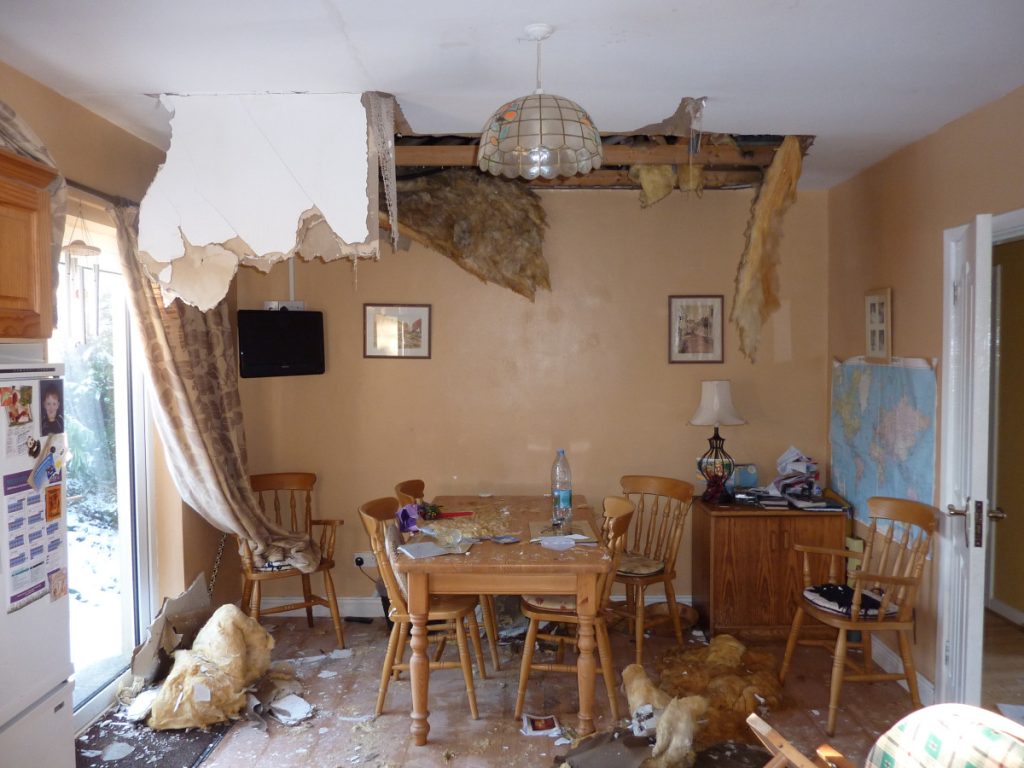A Comprehensive Guide for Insurance Policyholders in Ireland
In the crisp morning air of the sunny South-East of Ireland, my attention was drawn to the temperature gauge reading -7°C while dropping my son off at school. Such unusually low temperatures evoke memories of the freezing Christmases of 2009 and 2010 where I encountered readings as low as -15°C. However, beyond nostalgia, these frigid temperatures naturally raise concerns about the vulnerability of properties to burst pipes. In this guide, I will delve into the intricate steps that should be taken when faced with this daunting scenario and I will – of course! – emphasise the oftentimes critical role of a Loss Assessor.

1. Turn off the Supply of Water to the Leak:
Basil Fawlty might have called this the ‘bleeding obvious’ but it’s no harm emphasising the basics. Upon discovering a burst pipe, swift action is paramount. Locate and shut off the water supply before draining down the systems to minimise damage. Whether the leak is in a water supply system or central heating, a quick response is crucial. If in any doubt contact your Plumber immediately
2. Call Your Loss Assessor:
In the aftermath of water damage, engaging an experienced Loss Assessor is not merely a suggestion; it is a smart, strategic move. Loss Assessors bring regulated expertise to the claim problem that streamlines the process for the client and protects their contractual entitlements. It may be the property owners first leak but the experienced Loss Assessor has been there, and done that, many times!
3. Document the Damage:
Before embarking on repairs, meticulous recording of the loss is key. Practically everyone has, or at least has access to a smartphone. It costs nothing to photograph and video the affected areas, capturing the leak itself, the running water and damage incurred along with any belongings impacted. This visual evidence becomes a cornerstone when dealing with insurance companies and Loss Adjusters. No Policyholder has ever regretted taking too many videos or photos, but many have regretted not taking any! It has, all too often, quite literally been the difference between getting paid and not getting paid.
4. Mitigate Immediate Damage:
The Policyholder is under a duty to mitigate the loss and prevent further, avoidable, damage. Act promptly to reduce damage where possible. Use buckets and bins to catch as much flowing water as possible. Use scrappers, mops, towels etc. to remove standing water. Hire in a wet-vac, dehumidifiers and air movers to start the drying process in tandem with getting the heating back up and running, all of which your regulated Loss Assessor will provide expert guidance on.
Remember to remove undamaged items from wet areas ASAP. Your policy is there to cover damage to items directly impacted by escaping water, but not for loss that is allowed to develop on undamaged items because of inaction
If electrics have been impacted in any way, then a registered Electrician should attend to make the electrical system safe. This may involve shutting down affected circuits and providing supplies to get drying, heating and the property itself back up and running safely
5. Contact Your Insurance Company Promptly:
Time is of the essence; your assessor will assist in reporting the incident promptly to your insurance company. Providing essential details, including the date and time of the incident, a description of the damage, and any immediate actions taken to mitigate further harm.

6. Understand Your Coverage:
A thorough review of the insurance policy is essential. Understand coverage limitations or exclusions, particularly occupancy and un-occupancy, lack of maintenance, certain excluded causes will ensure a smoother claims process. At OMC Claims we consistently remind each other: not every loss is a covered loss; it is better for the client to know as soon as is practicable if there are serious questions as to whether the Insurer will provide an indemnity.
7. Obtain Professional Assessment:
Although, more often than not, the cost of repairing the leak itself falls outside the scope of policy cover, it remains the best advice that the policyholder should engage an experienced plumber to A) execute a professional repair and B) to provide a detailed report confirming the source and the cause of the leak.
This professional evaluation not only aids in understanding the necessary repairs but also serves as additional documentation required for your insurance claim. Ensure the plumber provides a written estimate of the repair costs. If immediate repairs are needed to restore the water supply or heating, obtain an invoice.
We would always recommend carefully retaining the damaged pipe, fitting or apparatus from which the water escaped on site for future inspection. While it is invaluable in demonstrating the nature of the loss to Insurers appointed Loss Adjuster it also preserves the evidence in the event a third party is responsible for the loss and therefore safeguards Insurers rights to subrogation/recovery.
8. Keep Records of Expenses:
Maintain a comprehensive record of all expenses related to the burst pipe incident. This includes receipts for emergency repairs, costs associated with temporary accommodation (if necessary), and any other out-of-pocket expenses incurred due to the incident.
9. Work Closely with Loss Adjusters:
Collaboration with the Loss Adjuster is crucial. Yes, there are times when the assessor-adjuster relationship is, necessarily, an adversarial one. However, in the vast majority of cases, the Loss Assessor and the Loss Adjuster will be working collaboratively to ensure the swiftest possible settlement reflective of and commensurate with the damage. An experienced Public Loss Assessor will preempt much of the information/documentation required by the Loss Adjuster thereby saving time and helping to expedite the claim process. A good Public Loss Assessor will always be on hand during the Insurance Company Loss Adjuster’s inspection in order to highlight specific details and answer any questions they may have.
10. Follow Claim Procedures:
Most of my colleagues at OMC Claims hail from a Loss Adjusting background: we know that the Insurer and the Adjuster need to make a determination. We leverage this knowledge to deliver the best outcome for our clients. This may include preparing detailed claim submissions, obtaining estimates for repairs, submitting requested documentation promptly, and cooperating with any investigations or inquiries conducted by the insurance company or their appointed specialists.
11. Be Mindful of Deadlines:
Insurance claims often have specific deadlines for filing and providing additional information. Although the situation was somewhat altered in the aftermath of the Consumer Insurance Contracts Act, 2019, an experienced Loss Assessor is always informed about these deadlines and ensures that the Policyholder meets them to avoid potential claim problems. If challenges arise, it is important to communicate proactively with the insurance company to discuss any necessary extensions.
Dealing with a burst pipe during freezing conditions can undoubtedly be a very challenging experience. However, by approaching the situation systematically and being proactive, you can alleviate much of the stress and financial burden. Immediate action, thorough documentation, and collaboration with professionals who are #OnYourSide are key to navigating the aftermath of a burst pipe with greater confidence and resilience.
Authored by Martin O’Brien, OMC Claims
*This article was first published in Irish Broker Magazine February 2024

With over 30 years of experience in the Construction Industry in Ireland, Martin is a Member of the Society of Chartered Surveyors and the Royal Institute of Chartered Surveyors. Holding a BSc (Hons) Degree in Quantity Surveying and a Certified Diploma in Loss Adjusting, Martin’s extensive background in cost and quantification positions him as an expert in property insurance losses. Transitioning to Owens McCarthy in 2009, he now handles all complex, technical commercial and domestic losses in the South East region, providing Quantity Surveying expertise to colleagues across OMC Claims. His wealth of experience and diverse skill set make him an invaluable asset in the property claim sector.







